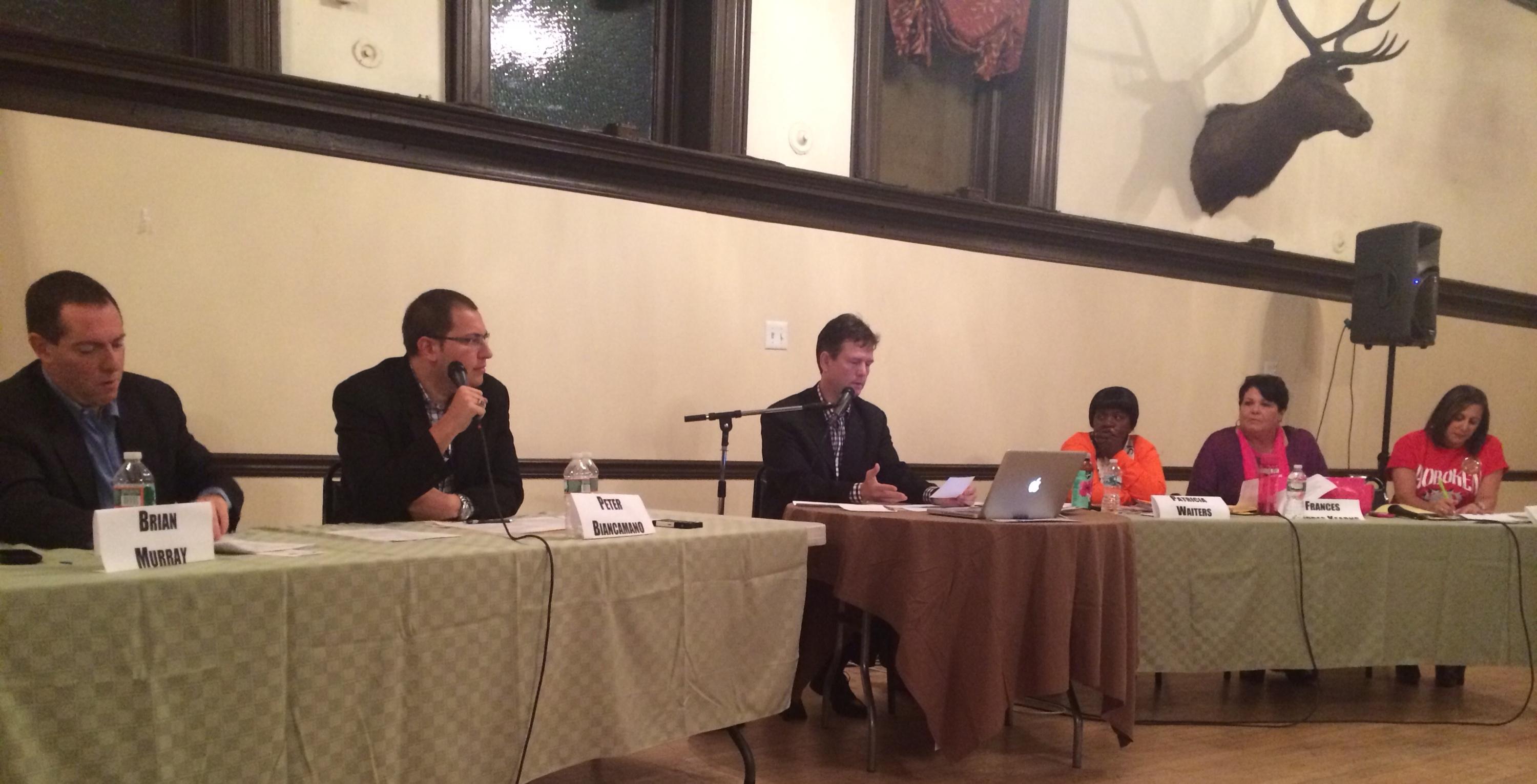Jersey City Mayor Steven Fulop, the only declared candidate for governor, committed to doubling New Jersey’s affordable housing production and a statewide right-to-counsel if elected governor as part of his housing plan.
By Daniel Ulloa/Hudson County View
The event was held in South Orange with Mayor Sheena Collum and Assemblywoman Sadaf Jaffer (D-16), both of whom have already endorsed Fulop for governor.
Fulop noted they had rolled out their transportation policy last month and plan to hold a similar event once a month to unveil a substantial policy platform.
“We need to address the housing issues facing younger generations in New Jersey. I’m really glad we’re talking about racial disparities and wealth and how to address that,” Jaffer said.
Fulop explained that his housing policy platform outlined a range of new policies related to tax credits and affordable housing.
“Most campaigns talk about taxes. The reality is the conversation around affordability is much more complicated. The lack of housing supply, both affordable and market rate, puts pressure on people to live beyond their means,” he noted.
Fulop acknowledged most have to live beyond their means due to the high cost of rent.
“We have a commitment to double the affordable housing production that has existed in New Jersey. This will be the first major piece of legislation that our administration would tackle when it takes office. We have a commitment in the first 100 days to make that a reality.”
Fulop said that Council on Affordable Housing (COAH) building mandates were blocked by several municipalities who opted to take the matter to court.
“It’s very expensive for both the housing advocates, the state, and the municipalities. Things don’t get built as quickly as they can. The process is not transparent. We want to make it actually transparent so the public can act knowing who is meeting their requirements and moving forward in a proper way. Transparency is important because most residents today don’t know what their municipality actually is doing,” he explained.
“We do want to tie stare aid you’re eligible for to meeting those goals on affordable housing. So there is a clear carrot … and a stick approach to penalize those that aren’t doing i.”
Collum said only 2,700 units of affordable housing were built in New Jersey last year and that they need to do better.
“That’s not a lot when you have an over 200,000 plus deficiency,” she added.
Collum explained most towns spent three to four years fighting affordable housing mandates in court and then finally settled after a prolonged battle.
“Some of the affordable requirements sunset after 30 years in the current set of rules, which we would amend,” Fulop added.
“When you talk about this 80 years, it will take the current rate to clean up the huge shortfall in affordable housing. We want to cut that down significantly. You have to make sure you’re not losing existing affordable housing units,” he added.
Fulop cited the right-to-counsel policy recently enacted in Jersey City as an example of significant progress in the housing realm that could be enacted statewide.
“We want to expand that statewide and allocate dollars to that. The public advocate is a natural place for an overseer and protector of residents,” he explained regarding his plan.
Jaffer also noted that a lot of policymakers aren’t renters and don’t take into account the fact that a lot of Black and Hispanic residents in New Jersey don’t own property.
“Tying state aid directly to meeting the goals of affordable housing would be part of what we’re doing. Part of that includes money for infrastructure to support the growth,” Fulop asserted.
He continued that this is a common complaint among aids, adding that often aid is not incentivized, therefore they’d look to seek every type of aid possible.
Fulop also said under the current state rules, Jersey City does not have an obligation to create affordable housing.
“No governor has dug into this in 20 years. [Chris] Christie obviously gutted it. Phil Murphy has gotten it going again, but we obviously still need to do more,” Fulop explained.
Collum noted Rutgers University released a report that showed “the impact on school-age children is actually negligible. In South Orange … for every market rate unit, we get one school-age child for every 37 units built … In fact, birth rates are much lower than we anticipated.”
Fulop also said tying financial aid to adopting specific affordable housing policies would persuade reluctant local officials to try new things.
As he did last time, the Jersey City mayor then had an extended Q & A with the reporters on hand.
“We need to tighten it (rent control) up and make clear around what is allowed and permissible from a rent increase. I think the language that says an unconscionable rent increase is very vague and probably intentionally vague, and that should be revisited,” Fulop stated.
“The cost to live in New Jersey … is very, very high, and it’s a mismatch even to the minimum wage. There’s a huge mismatch between what somebody can make and what somebody can afford. You need to control housing costs, increase more supply.”
He also wanted to increase wage growth.
“Jersey City has built more affordable housing than anyone in New Jersey. You could always do better,” Fulop declared.
He noted the Bayfront project has state aid, a 30-year payment in lieu of taxes (PILOT), and 35 percent affordable housing to spurn development on land that was vacant and polluted for 20 years.
Additionally, he said Jersey City Ward C Councilman Rich Boggiano had a plan for a 10 percent affordable housing mandate, which he considered a good idea. but it needed some fine tuning.
“ … It wasn’t legal. In New Jersey state law, if you don’t compensate somebody for taking their property existing zoning they are entitled to, then we would lose in court. So we’re reworking it with him to actually make it legal,” Fulop said.
He noted that the city bought the Bayfront land for $100 million and it’s the largest residential development in the state.
Fulop also acknowledged the high cost of rent in Jersey City, noting that their proximity to New York City has not helped in this instance.
“Part of that is because New York City and our surrounding areas have not built what they need to build. So it’s put pressure on Jersey City. We’re building six times per capita what New York City is building. That’s not right,” he declared.
Furthermore, Fulop said the COAH process is difficult and should be reformed.
“Even when the project is well-intentioned, you have a 20 percent or 30 percent set aside of affordable housing, it becomes sometimes politically very, very tough to do,” he said.
“Every tax abatement is a political show with people coming out and misinformation saying this person is not paying.”
Fulop further stated obstacles of red tape, eligibility, and tax credit rules need to be reformed to increase affordable housing.
In regards to a question on reform, “any parameters and protections you can put in place to limit corruption is a good thing at every level of government. But it’s not only developers, it’s public contractors and everything that touches government.”
Fulop explained filing campaign finance reports promptly increases transparency.
“We were the first in the State to develop those pay-to-play laws. And they’re very difficult to follow. And now they’ve been gutted with the Election Transparency Act. Those rules were good. The system is very porous, so transparency is very important.”
Fulop postponed today’s event which was originally scheduled in the aftermath of U.S. Senator Bob Menendez’s (D-NJ) bribery indictment, but as luck would have it, a superseding indictment accusing him of acting as a foreign agent to Egypt dropped minutes after the press concluded.
“A couple weeks ago, I changed my housing policy announcement to not collide with Menendez news… I scheduled my rollout for today…. Now this. I swear Senator Menendez haunts me since I ran against him in 2004… in any event my housing policy is now online as of an hour ago,” Fulop tweeted.








